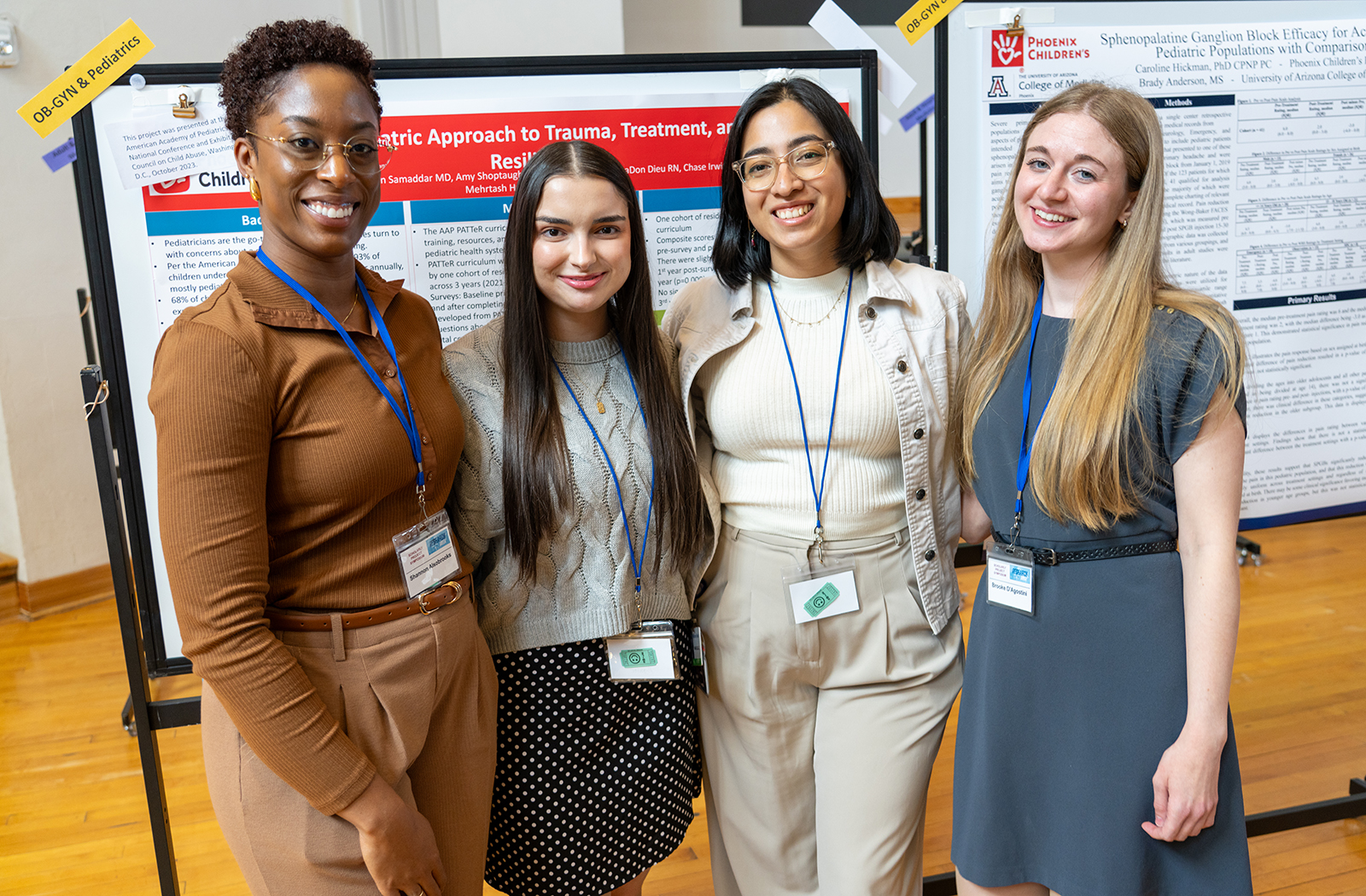
Inaugural Research Week Showcases Research from Students, Residents, Faculty and Community Partners

For the first time, the University of Arizona College of Medicine – Phoenix hosted Research Week, showcasing multiple discovery-oriented events that have typically been held at different times of the year. Held May 5 to 9, the event served as an opportunity to foster collaboration and highlight exciting research projects and discoveries among diverse groups at all training levels.
Chris Glembotski, PhD, vice dean of Research and director of the Translational Cardiovascular Research Center, noted the importance of bringing together such a distinct group of researchers. “The objective of research week is to encourage students, staff, trainees and faculty, as well as our extramural research supporters to learn more about the breadth of clinical and translational research being done at U of A College of Medicine – Phoenix,” he said. “We anticipate that in addition to experiencing a wide range of research projects, a main outcome will be to enhance collaborations between clinical and basic science research teams in ways that will increase the impact of translational research.”
Over the course of the five days, Research Week featured each of the events below and more.
15th Annual Scholarly Project Research Symposium
The annual Scholarly Project Symposium was a forum for attendees to engage with the Class of 2025 medical students and inquire about their scholarly projects and results during multiple poster sessions.
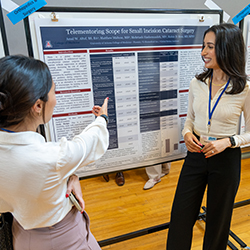
The College of Medicine – Phoenix is one of only a handful of schools to require every student to design and successfully complete a hypothesis-driven research project. Over the course of their four years of study, each student works closely with a mentor in a research area of their choosing. Through the process, they learn about medical information literacy, life-long learning, teamwork, effective communication, research methods, evidence-based medicine approaches and ethics related to scholarly inquiry (photos from the event).
Learn More About Our Students’ Research:
Biomedical Research: Bridging Science and Health
Biomedical Research: Bridging Science and Health focused on the research discoveries of faculty, as well as undergraduate, graduate and postdoctoral trainees at the College of Medicine – Phoenix.
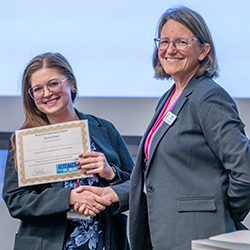
The day was divided into three central areas of research: cardiopulmonary, neuroscience, and cancer cell biology and immunology. And those areas were divided into several talks — selected from the top abstracts that were submitted — and headlined by college faculty. The faculty presentations included Dr. Glembotski, Isabelle Schrauwen, PhD, associate professor of Translational Neurosciences, and Suwon Kim, PhD, associate professor of Basic Medical Sciences.
In addition, trainees were invited to present their findings through posters. The top two oral and poster presentations of the day were:
Oral:
- First Place – Rayna Shaik, Gas Marble Therapeutics Mitigate Oxidative Stress in Chronic Wounds.
- Second Place – Ashton Jorgensen, PhD, Sex Differences in Cardiac Fibroblast Response to Transient Angiotensin-Converting Enzyme Inhibition.
Poster:
- First Place – Yang Zheng, PhD, Pathogenic Calmodulin Mutations Have Distinctive Effects on the Cardiac SK Channel.
- Second Place – Huzaifah Sheik, Evaluation of the Binding Profile of Novel Paxillin Cyclic Peptide for the Treatment of Melanoma.
29th Annual Michael D. Grossman, MD Academic Excellence Day
Since its inception, the mission of Academic Excellence Day (AED) has always been to promote an environment of academic excellence amongst trainees in our participating institutions. The 29th iteration of the event was no different.
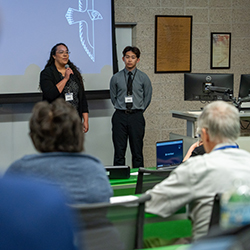
“AED provides a vital platform for residents and fellows from participating medical institutions in the valley to highlight their contributions to research and quality improvement,” said Melisa Celaya, PhD, director of Research Education at the college. “By supporting this initiative, we reinforce our shared commitment to fostering a culture of academic excellence, innovation and collaborative learning within graduate medical education.”
Offering a hybrid format, the event invited residents and fellows to showcase the volume of bench and clinical research, as well as quality improvement initiatives being performed across hospital systems in the state. This year’s event had 56 virtual poster presentations, 13 oral presentations and eight posters on campus.
Awards were given to the top oral presentations on research/quality improvement, as well as to the top posters for research/quality improvement and case reports for residents and fellows.
10th Annual ABRC-Flinn Research Conference
Bringing together grant awardees from the Arizona Biomedical Research Centre and the Flinn Foundation, this conference showcases their research advances through oral and poster presentations.
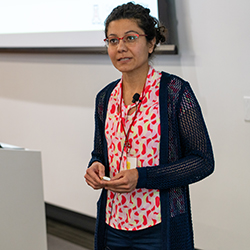
This year’s featured speakers were Melissa Herbst-Kralovetz, PhD, professor of Basic Medical Sciences, as well as Obstetrics and Gynecology and director of the Women’s Health Research Program, and Alexander B. Niculescu, MD, PhD, a professor of Psychiatry at the college and the founding director of the Center for Precise, Personalized and Preventive Psychiatry.
Dr. Herbst-Kralovetz shared how women’s health is being transformed through new non-invasive diagnostics for endometrial cancer detection and prognosis. Dr. Niculescu’s talk focused on how he is helping to build the mental health care of the future.
- Recap of the event – 10th Annual ABRC-Flinn Research Conference Serves as a Forum for Research Discovery and Innovation.
Research Mentoring and Education
The central themes for the final day of Research Week were mentoring and education. It kicked off with a Grand Rounds presentation from Sanjay Saint, MD, MPH, MACP, George Dock Professor of Internal Medicine at the University of Michigan, whose talk was titled Mindful Mentorship: Being and Effective Mentee & Mentor.
“In terms of selecting the right mentor, you want to find someone, ideally, who could serve as a role model — that you look up to, that you admire,” Dr. Saint said. “You want someone who will help you not just during the good times — that’s easy — but also through the tough times.”
This was followed by presentations from the Center for Biotech Research Development and Entrepreneurialism featuring Robert Theobald, MBA, vice president of Small Business Services at the Arizona Commerce Authority, who discussed the requirements for small business pursuing SBIR/STTR grants; multiple talks from U of A Research, Innovation & Impact and UAHS; and a mentoring education luncheon with Tara Chandler, MEd, assistant director of Mentoring Initiatives at the U of A.
Photos from Research Week
About the College
Founded in 2007, the University of Arizona College of Medicine – Phoenix inspires and trains exemplary physicians, scientists and leaders to advance its core missions in education, research, clinical care and service to communities across Arizona. The college’s strength lies in our collaborations and partnerships with clinical affiliates, community organizations and industry sponsors. With our primary affiliate, Banner Health, we are recognized as the premier academic medical center in Phoenix. As an anchor institution of the Phoenix Bioscience Core, the college is home to signature research programs in neurosciences, cardiopulmonary diseases, immunology, informatics and metabolism. These focus areas uniquely position us to drive biomedical research and bolster economic development in the region.
As an urban institution with strong roots in rural and tribal health, the college has graduated more than 1,000 physicians and matriculates 130 students each year. Greater than 60% of matriculating students are from Arizona and many continue training at our GME sponsored residency programs, ultimately pursuing local academic and community-based opportunities. While our traditional four-year program continues to thrive, we will launch our recently approved accelerated three-year medical student curriculum with exclusive focus on primary care. This program is designed to further enhance workforce retention needs across Arizona.
The college has embarked on our strategic plan for 2025 to 2030. Learn more.